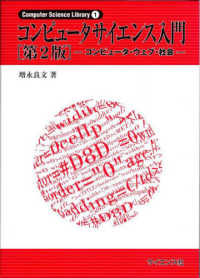- ホーム
- > 洋書
- > 英文書
- > Politics / International Relations
Full Description
Civil wars remain the most frequent form of political violence worldwide. They are becoming deadlier and more contagious, often spilling over state borders and drawing in regional and global powers. Despite sustained efforts to end them through negotiations, civil wars are also becoming more intractable: Frequently peace agreements break down and widespread conflict-related violence resumes.
This book explores whether and how civil war recurrence can be prevented. It examines the full course of peace processes that experienced conflict recurrence - often multiple times - before ultimately achieving the end of large-scale conflict-related violence. The authors use their innovative research design, the Multi-Stage Mixed Method Framework, which sequences machine learning, inferential statistical analysis, and congruence analysis, to transparently identify the factors that may help break the cycle of recurring civil war in 14 protracted peace processes, test them on a global dataset of the political agreements concluded between 1989 and 2016, and examine their impact on the protracted peace processes in Bangsamoro, Burundi, Côte d'Ivoire, Liberia, and Sierra Leone.
Through a complexity-informed theoretical lens, the book argues that the impact of peace accords is highly context-specific, but the careful crafting and implementation of peace agreements can help prevent civil war recurrence by fostering the emergence of coalitions for peace, i.e. multiple flexible and cooperative relationships between actors invested in building peace. The book demonstrates that the context-sensitive crafting of peace agreements, the committed international leadership of peace processes, and the adaptive implementation of the components of peace settlements in cooperation with grassroots actors, can mitigate the risk of civil war recurrence. In particular, the authors find robust evidence that UN leadership of peace processes and the incorporation of provisions to include women in post-conflict society substantially increase the probability of a stable end to conflict-related violence.








